#taro ramble
Text
Y6, Haruka, and “Flawed” People
I am still whittling away at my draft that goes a bit more in-depth about it, but I really like Yakuza 6. I think it’s great. I think it sucks. I think it’s the best and worst Yakuza game.
Today I saw a post about Haruka and how the series treats her, specifically levying some major gripes with her treatment in Yakuza 6. I’d like to talk about her presence in the game a bit, and why her (lack of) presence in 6 speaks to me.
This is a series that is bad at handling women. If I sit here talking about series-wide misogyny, even if I focus on Haruka, I will be here all week. But in spite of being shoved into the background, I think that Y6 is actually Haruka at her most developed and most well-rounded, especially coming off of the events of Yakuza 5.
This isn’t formal, I’m just rambling again.
In the beginning scenes of Yakuza 6, Haruka keeps her problems to herself. She bears the burden of being yet again thrust into a position of parental figure responsibility with none of the support or experience. She assumes, foolishly, that she can handle things on her own, and she does not allow anyone else to share in her burdens. She runs away from those she loves after their safety is potentially jeopardised when her past catches up with her.
Haruka’s disappearance is a parallel to Kiryu’s situation throughout Yakuza 5, and this is something that persists throughout the game. The more we find out about her actions prior to her coma, the more we know that she is her father’s daughter. She flees to somewhere distant. She tries to make it alone. She doesn’t open up about her past. Her companions’ knowledge of her past is only incidental, and again solely due to it catching up with her.
None of her actions in this game are out of line or out of character for Haruka. Specifically, none of the actions Haruka makes in this game are out of character for a character who we know, blood or not, is Kiryu’s daughter.
A lot of people get very incensed thinking about Haruka’s pregnancy. This includes anything from
Haruka being an adult
the pregnancy’s existence
the baby’s father
that this doesn’t make sense culturally, somehow
Haruka’s perceived previous responsibility and the perceived lack thereof because she has gotten pregnant
a general lack of understanding of young mothers & unplanned pregnancy
the idea that this would “only happen for the plot”
Discussing these in no real order:
Haruka entering a relationship, being an adult with her own responsibilities is not the end of the world, and having a child is not the end of her world. The series shoving her off screen even when the game centres mostly around her circumstances is.
To suggest that something like getting pregnant is out of character for a runaway teenager, regardless of her background, suggests ignorance about young women, about pregnancy, and the stark difference between responsibility for others and responsibility for oneself. Young mothers are stigmatized, judged and disrespected worldwide, facing complex forms of misogyny and wider societal discrimination, and the way some fans discuss Haruka’s situation only emphasizes this. The way some people talk about the series’ female characters in general (thinking of Park here) really shows their ass, and it’s not like the series treats them any better!
Culturally, Haruka’s existence is ripe for predatory tabloid journalism that those in Onomichi protect her from. This is something that Mirei instils in her in Yakuza 5, specifically in the context of being an idol: her past is told as a cautionary tale, the fall from grace that getting involved with yakuza and a young pregnancy can set off. Haruka does not get pregnant within the context of the idol industry, sparing her from the wider public eye. But Haruka’s decisions also come in the context of having been in the industry, of having to reign in her own expression to be someone that is looked to and looked up to, and having ended her place in it with an emotional send-off.
This is a series that beats you over the head with themes of failure and “mistakes” repeating across generations. There are so many angles it can be approached from. Are you inevitably doomed to repeat the actions of those before you? Are you deciding the fates of those that come after you? Do you make your own fate? Yuta’s entire character arc embodies this. Y6, as flawed as it was, emphasized this theme more than any of the others.
Everything that is put in this game is put in for the sake of the plot. Not every action exists for the sake of furthering said plot, but the main story exists to tell a narrative.
Haruka has been portrayed as responsible (overly so, in Y1) with few faults (thinking of the Y3 substory here) since her debut in the first game. I think that Y5 - and Y6, even with how little screen time she is allowed - are the peak of her being in-character, because she is allowed do things that can be considered mistakes. Her on-screen childhood is mostly spent being put into the role of an eldest daughter, and her position as an idol only compounds on her perceived responsibilities. It feels refreshing to see her allowed to be someone whole, imperfect, doing the best that she can in her circumstances and with what knowledge she has.
Again, if I were to sit here and talk about the series’ complex history of misogyny and poor characterisation of its female characters, I would be here all week. All of the information we have on Haruka’s own experiences is told either in flashbacks or by other people, because for a game that ultimately centres around her & her child so heavily, she appears on screen for a good five or so minutes. The series isn’t good with women. I think we all know that.
I have a lot of gripes with Y6. It’s a flawed game. It’s a good game. It’s made me feel more conflicted than any other Yakuza game, which is why it’s one of my favourites. And while I’ll stay here wishing endlessly that I got more of her on screen, speaking, talking, telling her own story, I think that the Haruka we got in Yakuza 6 is the Haruka that’s been built up to in six amazing games. There’s no doubt that she is Kiryu’s daughter.
What a fucked up last line to tell your daughter at the end though, Kiryu can fuck off.
Let me know what you guys think!
#yakuza#yakuza 6#sawamura haruka#haruka sawamura#what a goddamn game#taro ramble#as always let me know how you guys feel#I chatted with a few pals while typing this up#lots of good discussion
51 notes
·
View notes
Text
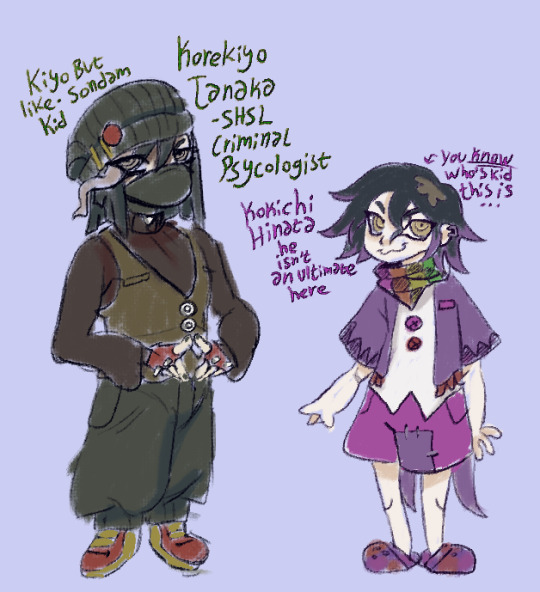
can we pleeeease bring back this "NDRV3 r the kids of the surviving cast" au thing i'm such a sucker for it here are some of my personal headcanons
#danganronopa#ndrv3#sondam#komahina#nagito komaeda#hajime hinata#my art#pls ask me more about this#i have an entire like tree for each of the kids and their relations#not featured here kaede is also a sondam kid and kiyos sister but i didnt draw her cuz im lazy and also i dont want ppl making creepy comme#taro is also kokichis brother#okay ill stop rambling in the tags now
111 notes
·
View notes
Text
love letters to kiseki
words can't really encapsulate what i'm feeling now but that's not going to stop me 😭

谢谢你们的陪伴
希望你们也能找到自己的奇迹
累了,就休息一下,坚持,会看到曙光
不让自己后悔就好了~
-徐恺
Thank you all for journeying along.
I wish that you would be able to find your own miracle.
If you're tired, rest a little, hold on, you will definitely see the dawn
What matters is that you have no regrets ~
-Hsu Kai
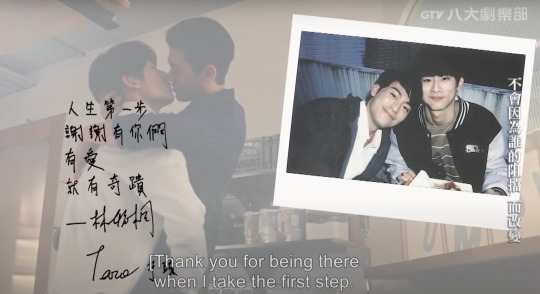
人生第一步
谢谢有你们
有爱
就有奇迹
-林毓桐
This first step into adulthood,
thank you all for being here.
As long as there is love,
there will be miracles.
-Taro Yu Tou

谢谢支持《奇迹》的所有人
相信自己 奇迹终将降临
-陈柏文
Thank you everyone who has supported Kiseki.
Believe in yourself, miracles will eventually arrive.
-Chen Bowen
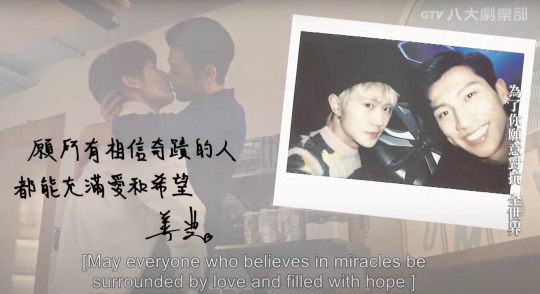
原所有相信奇迹的人
都能充满爱和希望
-姜典
I wish for everyone who believes in miracles,
to be filled with love and hope.
-Jiang Dian
The 4 actors sang the OP while their messages to fans were shown. My translation for the OP can be found here.
To Hsu Kai, thank you for the elegant performance. It's amazing to see you looking out for your juniors, making them comfortable, and having fun with them.
To Taro, your first performance was amazing. Thank you for the calmness and maturity you bring into the fun.
To Bowen, thank you for always being so sunny, humorous, and uplifting. Your disposition probably belies some vulnerabilities but I'm glad you managed to share some of them with DianDian. All of us can see the care with which you regard DianDian and that makes my heart so full. You have such a wonderful personality and you most definitely played a significant role in bringing Ai Di to life.
To DianDian, thank you for the heartbreaking performance that broke my heart multiple times. Your acting is phenomenal, especially your micro-expressions. I love your insights and how deeply reflective you are. You put so much care into understanding and portraying the psyche of your character - a testament to your artistic soul. It surprised me but we see all the fun you have with our resident golden retriever, and how much more comfortable you are in his presence; it makes my heart doubly full.
谢谢徐恺和毓桐!
谢谢伯文,也谢谢典典!
This chapter may have closed but the characters and actors that brought them to life will remain in my heart 💕
#kiseki: dear to me#bai zong yi x fan ze rui#fan ze rui x bai zong yi#bai fan#chen yi x ai di#ai di x chen yi#chen ai#hsu kai#taro lin#chen bowen#nat chen#jiang dian#louis chiang#ramblings#they are making me cry#pretend you do not see my bias leaking through
65 notes
·
View notes
Photo


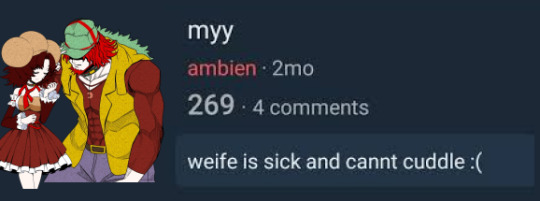



happy valentine’s day!! here’s some qmai content bc i think they’d be this type of couple
#rambling#yttd#your turn to die#kimi ga shine#q-taro burgerberg#mai tsurugi#qmai#yttd qmai#i love these posts so much shoutout to the guy who made them#i wish him and his wife nothing but happiness and good times in their lives#kai satou#anzu kinashi
180 notes
·
View notes
Note
talk about iron will's importance. now
Iron Will's importance to the series is kinda threefold, tbh.

On one level, it's clearly a reference to the Dragonslayer of Berserk fame, and therefore one of Taro's clear inspirations for especially the first Drakengard, where it appears as Hymir's Finger*.
Consequently, it's also tied in to Caim as the 'discount Guts' of the Drakenier universe***, which is extremely important to the events of Nier. See, I may be wrong about this, but aside from the Nameless Blade you get at the start, Iron Will is I think the only weapon the game... gives you? Like, there's weapons you get in the course of the story, but Iron Will is the only weapon the game itself hands you in a cutscene, and as such is kinda... by necessity relevant? Like, active thought had to go into handing you that sword at that point in the story, and considering that this is very early into Act II of the game, where our protagonist takes a darker turn along with the rest of the story... well, I may be too far up Mr. Yoko's thematical backside (please see next paragraph for evidence of that), but... I don't think it's an accident that you get given a weapon so closely associated with Caim at this point in the story, especially when the conversation immediately following Iron Will's completion ends with Nier resolving to help Gideon's mad quest for revenge purely because he gets to kill a single Shade at the end of it.
On a level deeper than even that load of nonsense, the evolution of the Iron Will as a weapon kinda mirrors the evolution of the series itself? As presented in Drakengard 1, the weapon story is about the weight of death, with the unsettling implication at the end that perhaps the sword has found a wielder who is unconcerned with death, a perfect microcosm of Taro's then-philosophy of 'you have to be pretty fucked up to kill people'. This evolves down to Nier, where the sword begins by boasting of the people it kills, but in the final part of the story admits that it dreams of things beyond its status as a weapon of slaughter. Then Drakengard 3 portrays it as a thing that despises its own existence as a weapon, consumed by bloodshed and longing for something it cannot have - kinda like Zero, eh? And finally**** Nier Automata, where the Iron Will is rusted, useless and abandoned, but dug up regardless to engage in unceasing pointless war, over and over again. That's the inherent advantage of the Iron Will, I think - it allows Taro to present the theme of the games in microcosm, because the weapon itself does not need more explanation than 'Dragonslayer at Home'.
Soo... yeah. I think the Iron Will is really important to the themes of Drakenier, and I'm really exited to kill all of humanity wielding it this time around the Replicant train.
*whose name, incidentally, plays into the 'reverse religious morality' thing that Drakengard 1 has going on thematically - in much the same way that the final two routes are the literal Red Dragon of the Book of Revelations fighting the literal angels of heaven alongside a man named after a literal demon, you do it wielding a sword named after what might be interpreted as either the creator god or the father of evil from Norse Mythology.**
**Which, in a weird way, also plays back into the Berserk influence - Guts in that series is fighting against something called The God-Hand, after all, but we're not here to get into Berserk right now.
***I don't know for sure if it's the sword Caim uses in Drakengard 2 - looking at the video of his arrival now I can't tell if it's Broken Iron or his own personal sword - but honestly it feels like it should be Broken Iron, so I'm counting it.
****I know what the DOD2 and Reincarnation stories say, but Drakengard 2's is about as bland as everything else about that game, and Reincarnation has the inherent problem of being a LiiiiVe SeeeRvICE, so you can't easily sum up the themes of every single story in it.
#nier#drakengard#drakenier#nier replicant#nier automata#drakengard 3#iron will#yoko taro#my deepest apologies if this came off as incoherent and rambling#my abyssal apologies if it didn't#I just... really like the themes of Drakenier#it's really special to me
115 notes
·
View notes
Text
something that i’ve been hung up on is taro’s line, “there’s nothing scarier than an ordinary/normal person” because i feel like it represents how he’s truly fearful of ‘ordinary’ people.
‘ordinary’ people are the people who didn't understand taro. it’s the people he grew up around and the people who rallied against him. ordinary people avoided him and found him weird for reasons he couldn’t understand. and most of all, it’s the ordinary people who didn’t come to his birthday celebration when he was a kid.
throughout the series, it becomes evident that taro, despite his cheerful optimism, hasn’t really moved on from his childhood. even though he’s oblivious and doesn’t seem to understand a lot of things (like why lies exist until sonoi explained it to him), he still feels hurt and puts those offhanded comments close to his heart.
you can see this in the episode where shinichi and haruka are asking questions after questions and taro responds that he does what he thinks is right (and that he doesn’t really know what’s going on either). shinichi basically tells him that taro isn’t normal, that he’s different. “unlike you, we’re ordinary people”. while it’s the truth, taro seems visibly affected by his comment, which makes sense. he was isolated and abandoned for not fitting in with the ordinary.
as the series progresses, you see taro go though a pseudo-character arc where he accepts the qualities that makes him different and uses it to protect the members of the donbrother– people he has a “bond” with. from around episode 15-onward, he embraces the fact that he’s different and even says “there’s no one like me. no one can replace me. i’m unique” (not the exact quote but you know what i mean).
throughout donbrothers, taro is searching for a bond, perhaps in the form of a family that offers unconditional support. because he's been abandoned and isolated by 'ordinary' people for the mere fact of being different (not conforming to the norms), he searches and searches for a pseudo-family similar to that the ordinary people have.
a family that taro doesn't have, because he's different.
and i wonder at times if taro has ever tried to 'fit in' and conform to the norms in his childhood. i don't think he would have succeeded because it's sort of implied through his flashbacks that child!taro seems to struggle with the concept of theory of mind.
(theory of mind: the capacity to understand others' mental states and the knowledge that others' mental states may be different from one's own)
taro's form of helping (and maybe even making friends) was (and still is) to bluntly tell what's wrong and correct them by doing it the right way. because in taro's mind, who wouldn't want to do things the right way? he doesn't consider the aspect of pride that people may have, so even if they realize that they were doing something the 'wrong way', they wouldn't appreciate being told such a thing, which is something taro doesn't understand.
i think through continuous isolation and comments of being different made taro realize that he's not like everyone else.
that being said, donbrothers sort of implies that taro exists to help people and that he doesn't exactly have dreams and desires... but that's not exactly the case at all.
he obviously desires for a bond–a family, and maybe even friends. he wished that he and sonoi weren't in the circumstances that they were in ("if you weren't a noto, then we...") and he wished to eat oden with him.
moreover, i feel like there's always a slight expression that can be interpreted as envy and desire whenever taro looks at a family. (ex: when he looked at kijino and miho being happy and when he was pretending to be higashi kouichiro (tomoko's son) and she was attacking the hitotsuki because she wanted to protect her ‘son’)
anyway, taro's comment about jiro becoming 'ordinary' got me thinking a bit because it's said in such a bittersweet way that makes me think that for taro, his companion being 'ordinary' may mean that he's going to be left behind.
and i think the show emphasizes this idea of taro being left behind/being different in various ways, the most interesting ones being that of the noto 123 and miho (juto). even though the noto 123 and miho only resided within the human world for a short period of time, it becomes abundantly clear that they, especially miho, understood humans better than he did/does.
but even though taro felt like he was being left behind (jiro becoming ordinary and the other members of donbrothers having their own lives (symbolized through them leaving in the beginning of 49) ), his companions/family dispelled such thoughts by planning a birthday party for him. haruka and sonoza, who were working on the manga, dropped what they were doing in order to celebrate taro’s ‘birthday’.
it’s a little ironic that taro, who desperately searched for a bond (a family) and was constantly left behind was the one who left everyone in the end. obviously, it was out of his control, but it’s something i think about regardless.
especially because taro finally found a family he’s been searching for such a long time… but the bonds he created were severed and he’s alone all over again, once again searching for a bond.
77 notes
·
View notes
Text
OKAY
So after doing @beanieman’s bingo like y’all said I’m ranking in what order my kins would be apparently if I understood it at all (based on who has most checked off—there are some ties)
Gin Ibushi (14.5)
Alice Yabusame and Shin Tsukimi (both 12)
Sara Chidouin (11.5)
Q-Taro Burgerburg (10.5)
Nao Egokoro (10)
Keiji Shinogi, Joe Tazuna, and Kanna Kizuichi (all 9)
Reko Yabusame and Kazumi Mishima (both 8)
And lastly Kai Satou (7.5)
I’m not sure if it’s very accurate but this was fun to do! And the results are TERRIFYING!! :D
#your turn to die#yttd#please no.#rambles#bingo#gin ibushi#alice yabusame#shin tsukimi#sara chidouin#qtaro burgerberg#q taro burgerberg#nao egokoro#keiji shinogi#joe tazuna#kanna kizuchi#reko yabusame#kazumi mishima#kai satou#now im curious about what it would be for the others in Bingo Score terms#like side characters or floormasters or my Beloved and Beloathed Dummies
14 notes
·
View notes
Text
i need to do like low effort doodles to organize my thoughts on the Things
like how do i eloquently elaborate that the "God" and watchers from Drakenier would absolutely send a plague or disease that turns people into stone and then inadvertently have said humans discover and use the energy from the human soul "ergo" to advance the speed of their own destruction.
What I like about both said games and stories of that world is that its a story about pain, misery, hope, secrets and lies are all such human things. I often think about the protagonists in Yoko Taro's works and how you don't necessarily have to be good or bad you just have to think you're right. I feel so excited thinking upon these scenarios that can be applied to P and his own dilemma on being "good" and the choices the player can make telling lies or the truth in any given scenario, I feel like what makes this really effective in the setting of Krat is that all of the cast and characters have a secret, withheld information is kept away from the player to be discovered. An end to justify the means. Meanwhile the whole world seems to be falling apart.
#mikh talks#drakenier#lies of p#shouuuld i tag spoilers or is this vague enough#bro i was like bouncing when i realize how morally fucked up the alchemists are and also the 2nd phase of Simon Maus fight#it was soooo cool#i also just love metaphors using puppets/androids/nonhuman entities discovering the meaning of being human#its literally in my url its my jam#when they intentionally obscured what the bosses said i was like ohhhh they're gonna do it theyre gonna knock me upside the head#THE SHADES#im sorry if this looks like the ramblings of a mad man you could literally just ask me questions if you wanna know what i think of it etc#i think its fun to think about and i know just a stupid amount of drakenier lore and short stories#also yoko taro works have a history of referencing fairy tales with some sort of twisted reveal so its refreshing seeing more interpretatio#i never really thought much of the source material of pinnochio but this has me fascinated
11 notes
·
View notes
Text
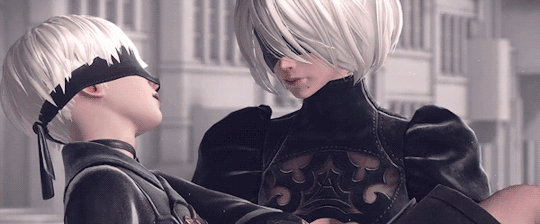
bought nier automata when i was 13 and had my whole worldview changed bruh
it’s also what got me interested in philosophy 😵💫
#do it for her (your thirteen year old self)#nier#changed my brain chemistry#nierposting#nier automata#2b#yoko taro#drakenier#9s#philosophy#ramblings
8 notes
·
View notes
Text
So this is a thought that I’ve been mulling over as I keep watching Donbrothers, and after finishing episode 44 it’s one that finally fully formed in my mind, and I think I have the words to articulate it in writing now.
It’s a thought about Taro Momoi. As the Red Sentai Ranger he’s obviously going to impact the story a lot, it’s in his nature to from the moment the series starts. But there’s one specific aspect of his character that keeps catching my focus, and it’s his inherent inability to lie about anything and everything.
The thought that I keep coming back to is that if you chose to watch Donbrothers with a queer reading in mind, that specific characteristic has such a farther reaching impact on both Taro and the narrative as a Whole.
(And before I go any further, I’ll put my little disclaimer here that this is not me saying you Should watch Donbrothers with this reading or anything to that effect. It is after all at its base level a sentai show meant to sell cool toys. You don’t have to give it this depth, it’s fine without it. I however am a queer person and I find it fun to do these kinds of readings as a thought experiment and I like writing about it for others to read.)
But anyhow.
Putting the rest of my thoughts under a read more because it got very long ~
The thing that gets me about Taro and his inability to lie and the fact that he has such an obvious tell for when he Is lying - that being that it literally kills him - is that it Forces Taro to go through his life living as his 100% authentic self. There is no way for him to hide from the rest of the world, no shield of little white lies or even a false persona that he can put on to keep himself from getting hurt. And he’s more than aware that A. His inability to lie Does hurt other people, which in turn hurts him as well, and B. It often puts him at odds with others due to how it can make him come off as ruder or more careless than he might mean to be. But it’s not something that he can change about himself. He’s tried, multiple times, and it’s just not something he’s capable of doing no matter what effort he puts into it.
And this has been a persistent issue for him since early childhood. It’s this very fact about Taro that makes an entire village move away when he’s still a young boy because in his attempts to help people by being honest and upfront with them, he drove them to hate him for his perfectionist streak instead. He couldn’t soften his words or tell them that they were doing just fine but that he wanted to help them, instead everything comes off blunt and matter of fact and over time it drove people away from him, until only he and Jin were left in their little neighborhood.
Taro’s inability to lie is something that the rest of the Donbrothers challenge him on throughout the entire series. It’s something that they actively either try to work to get him to break on, or they bemoan the fact that it’s not something he can fix about himself. Sometimes this is played for laughs, but more than a handful of times it’s also the cause of actual annoyance or even a level of anger from Taro’s teammates directed at him for this thing that he cannot change about himself. Over time Taro has learned a good bit how to at least supplement his blunt honesty with some careful phrasing so that he’s not as rude to people about things, but this still doesn’t change the fact that he cannot lie, and therefore cannot change a core part of himself or use lying as a way to shield himself from things like the others can.
That’s exactly why its such a huge deal to him when Sonoi is the first person to show up in his life, very early in the series, and tell Taro upfront that not only is his honesty a fine trait that he has, but that it’s also something he likes about Taro. Sonoi, before their shock at finding out each others true identities, literally calls Taro his hope and reaffirms when Taro comes to him about this issue more than once that he thinks Taro is fine as he is. This is something that I think ends up being a huge part of why the two of them end up still being close even after all of the fighting and literally killing and reviving each other that goes on through the series. Even after the many shocks and betrayals, the fact that their relationship (whatever you chose to view it as/whatever the narrative might imply it is) started with such openness and honesty makes for a very good foundation for the two of them. There’s already so much out in the open at that point that neither of them can pull back for long. Sonoi’s efforts to do so barely last more than a few episodes, and Taro never stops being anything less than genuine with him in all of their interactions from the first time they meet.
And speaking of Sonoi and his fellow Noto companions...
Sonoi may not have a problem with lying in the literal sense like Taro does, it certainly doesn’t kill him at least and he can lie with his words all he wants with no repercussion physically. But as the series goes on, you start to see that he’s lying to both himself and his teammates about a lot of things, and it slowly stops working and starts becoming something that is an actual roadblock for not just himself but for Sononi and Sonoza as well. And Sononi and Sonoza are also lying to themselves and each other as well, and it’s not working for Any of them!
Sonoi has to be called back to the purpose of their work multiple times in the beginning of the series because it becomes clear to the others that whatever fascination he has with Taro is beginning to impede their goal of wiping out the Hitotsuki, and then post the first time he kills Taro, he visibly Wilts and states that he does not like himself for what he’s done. He becomes unable to lie to both himself and to Sononi and Sonoza that he’s happy with this outcome even though he should be. He’s a Noto who just took down Don Momotaro! In any regular circumstance, this would be something that he’d be proud of, no matter the method he used to do so. But because he did so by exploiting Taro’s inability to lie to him, something that he told Taro multiple times he liked about him, his victory rings hollow, and instead becomes something he’s actively upset that he did, even when the others think he did just fine. It’s why he helps to bring Taro back, it’s why they both agree to a fair duel that they won’t regret, it’s a catalyst for so many things later on down the line.
Sonoi’s inability to lie to himself and keep going with his duties as a Noto general without interference is what eventually leads to his realization in episode 44 that he and Sonoza and Sononi are all alike in the fact that they’ve grown attached to or become fond with humanity, and this fact puts a target on all of their heads and makes them enemies to their own people. Sononi got so caught up in the love affairs of Tsubasa and his search to bring the real Natsumi back that she fell for him in the process and took multiple hits to protect him, and it almost kills her! And Sonoza, who only ever wanted to understand human emotions and how they work, ended up as the manga editor to a teenage girl who he genuinely wants to see flourish in her work that brought him such joy and who’s respect he’s earned in the process. All three of them start off the series as very serious in their duties to take out the Hitotsuki (and later the Beastials) and slowly over time it gets so put to the back burner due to the connections they’ve made that even their superiors had to intervene to remind them of who they are and what their purpose is. And in the end even that doesn’t work. Not only can they not lie to themselves after a point, but they can’t lie to Sonoshi either. And he makes it very clear what kind of mark that puts on them and their fates before eventually leaving them to their own devices again.
Sonoi, Sononi, Sonoza and Taro are all alike in the fact that they end up being unable to lie/hide things about themselves to themselves or others for one reason or another about core parts of who they are. And it’s this fact alone that either puts them in direct danger, or makes their attempts at navigating the world around them a lot harder than it might otherwise be if they could just lie and shove things under the rug.
I don’t personally read Sononi or Sonoza as queer themselves, but in the case of Taro and Sonoi specificallty, especially with how the overall narrative hints at things and all of the imagery and implication and even outright textual statements, I think it becomes very easy to see how this can all be viewed in a queer light. It at least rings true for me as someone who went through the struggle of being unable to hide myself and having to pay the price for it by running from my home and the dangers that staying there held for me.
Seeing as I haven’t finished the series yet I have no clue if this is something that the Noto trio will end up doing for themselves, but I wouldn’t be at all surprised if they had to do so, and that in itself would lend even more weight to the comparison I’m trying to make here. Either way, it’s been an emotional journey to watch all of these characters come to the place that they are now in the narrative and how they’ve grown and are trying to make their way in the world as they are, and it’s certainly not something I’ll be forgetting anytime soon.
#avataro sentai donbrothers#donbrothers#taro momoi#momoi taro#sonoi#my meta#kief rambles about donbros#god this took me forever to get down so im sorry if it reads a little disconnected or anytging#i tried my best to convey what i was thinking here
20 notes
·
View notes
Text
i started school again today! (i’ve spent the entire day doing nothing other than strolling around campus & drinkin’ boba . . . )
#I’ve had two milk teas already 🤭 taro ‘n brown sugar!!!#finally in my junior year of college mhm#another year of computer science yayyyy :(#but for these first two weeks my schedule is pretty light! not too much goin awnnn yet#୨୧ — isla yaps#୨୧ — mira yaps!#❥ — rambles!
7 notes
·
View notes
Text
I have an idea for a Den-O thing but I still understand nothing about how that series work so I’m just here going “???”
#kiri.text#shenanigans with the taros? I'm great at that#but the second I think about the humans who don't live outside time I'm just ???#sometimes I remember I made a sideblog specifically for this 1am ramblings I should probably use that
8 notes
·
View notes
Text
Random thought of the day: Diego and Klaus doing "Get help"
79 notes
·
View notes
Text
taro really did get pretty much incomprehensible at times huh
8 notes
·
View notes
Note
I also see Momoi Taro and Shiba Takeru being friends honestly. Their personalities seem rather similar, don’t you think?
In a way, yeah~! They would get along.
I think Taro is a bit more extroverted than Takeru, who grew up rather sheltered all things considered. While the two found friends (or loves depending on how you view it) within their teammates, these two in a room alone together would be interesting.
It's quiet at first but Taro would honestly feel...a bit intimidated by Takeru's stare but respect him as a senpai of course. Takeru would honestly be judging Taro, not in a negative way but sizing him up. They can trust the future to many Sentais after them but Taro has proven himself to be a strange outlier in a fashion that hasn't been seen in most of the kouhais.
They both have this...magnetism. Takeru's is proud and noble, something you would see straight out of an odyssey, a leader you want to follow into battle and die for. But also he has this...loneliness of a man who never got to have a correct childhood, deprived of friends and a support system just because he's important.
Taro's magnetism is bright, a simmering flame that makes you want to get closer and closer. It's warm and bright but it's...passionate. It's something that could boil over and light up the night and drag you closer and closer. It's like a bonfire at a festival. You stay by his side because he takes you on adventures.
They are "drawn" to each other like this. A calm lord and a festive lord. So I think they would enjoy having tea together, talking about their comrades, their adventures and their lives.
I guess...in a way, because of their similar childhoods, I think they would tell each other...
"You're not alone, someone out there cares for you. You just need to find them."
And then probs play some sort of game together or something like Go or chess.
#peeps' ponderings#askrikkaiandhyotei#shiba takeru#momoi taro#extremely rambly and not rly chara study but also kinda chara study
11 notes
·
View notes
Text
something i think about at times is how momoi taro’s memory was wiped completely. he has no memories about his friends nor his family. he forgot his own father, albeit adopted, and i wonder how that would affect his interactions with other people.
when other people talk about visiting their parents, taro has nothing to say because he doesn’t remember them. maybe the faintest flash of something, but definitely not a clear recollection.
friends? taro doesn’t know. he remembers happiness—the vaguest memory of being happy, but where are they now? did he leave them or was it the other way around?
taro would know what happiness is but not why. where did he experience the happiness? with whom?
37 notes
·
View notes